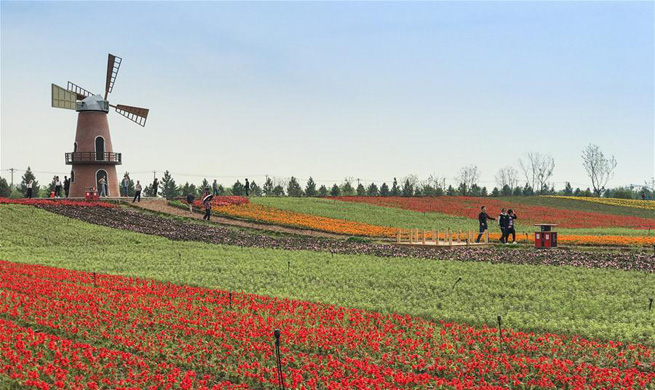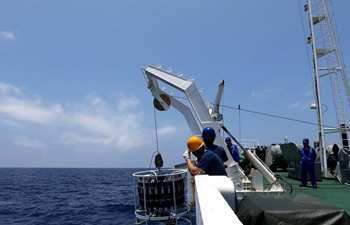GAZA, April 27 (Xinhua) -- Palestinian experts warned on Thursday that the recent increase of crimes in the Hamas-ruled Gaza Strip was due to an increasing despair and frustration among the populations, a result of the mounting tight measures imposed on their daily life.
This week, the Hamas-run police spokesman in Gaza, Ayman Al-Batniji told Xinhua that about three murders were committed in the Gaza Strip in less than 72 hours; two because of theft, adding that "those who committed the murder had been arrested."
Following the increasing rate of crimes in the Gaza Strip, that suffers from high rates of poverty, unemployment and despair, the experts warned that the increasing rate of crime would lead to an increasing warning regarding entering a wave of chaos in the coastal enclave.
This may be advanced by further deterioration in the economic situation and the lack of basic services. Last week, Palestinian President Mahmoud Abbas and his Fatah Party warned of taking "unprecedented tight measures" against Gaza if Hamas rejects to handover the Gaza Strip under his command.
The police in Gaza said they arrested a young man who killed a mother of four children by stabbing her to death inside her apartment after he tried to steal golden jewelry. Two days after this incident, an elderly man fell from a building while trying to protect himself from a thief who broke into his home.
Gaza rights statistics recorded 14 deaths including three cases motivated by theft since the beginning of this year in the Gaza Strip only, which is overcrowded with two million Palestinians. High deaths rate was simply due to the absence of security control.
According to the same figures, the Gaza Strip record in the year of 2016 is about 77 deaths because of security disorder including five crimes caused by theft.
These terrifying incidents raised concerns in light of continuous economic crisis aggravation in Gaza which is besieged by the Israelis since the mid of 2007 as a result of Hamas (Islamic Resistance Movement) control over the strip.
Israel imposed restrictions on crossings located on the borderline with the Gaza Strip, where restrictions included the movement of individuals and goods.
According to the Palestinian Central Bureau of Statistics, sequential years of blockade were the reason behind the lack of basic services crisis in addition to the highest unemployment rate in the world which is about 42.7 percent.
Previously, human rights groups warned that many families in Gaza would be under the poverty line with the daily average of two dollars income per capita which would make them depend heavily on relief aid.
What made fear spread more among people in Gaza is that the escalation of theft and murder incidents came after the consensus government deducted more than 30 percent of the Palestinian authority employees' salaries.
The recent incidents of murder and theft were covered in the comments by activists on social media websites which also became the street talk in Gaza. However, Al-Batniji said that the killings which recently occurred "do not reflect planned crimes but accidental incidents."
He added that each incident of theft or killing is due to different motives, indicating that the general security situation in the Gaza strip is "under control and there is no cause for concern from a wave of looting."
The Ministry of Internal Affairs run by Hamas said it launched a campaign to pursue what it described as "spreaders of falsified news and rumors through social networking sites in order to protect the community from abusers."
The security file remained as the most prominent pretext of Hamas movement which successfully enhanced its experience in administrating Gaza after its tight control on security.
Furthermore, a human rights and political activist from Gaza, Mustafa Ibrahim, mentioned that the killings in the Gaza strip turned into "a danger that threatens the social fabric, immunity, and connection of people towards each other."
Ibrahim also highlighted that people in Gaza began to lose confidence towards those who are responsible of taking care of Gaza because violence, murder, drugs, and theft indicate that the society became violent and fragile suffering from immunodeficiency.
He added that what is happening "is not a coincidence in which many global and local studies suggest that high rates of crime, theft, and drug addiction are a result of economic, political, and internal division."
The escalations of incidents such as murder, theft, and drug addiction are natural consequences of the nightmarish reality which lies in the internal split, economic and social conditions.
Settling things down requires a collective national effort for the sake of getting rid of social and economic isolation that people suffer from, according to Ibrahim.
Over the past years, several negotiations regarding uniting the West Bank and Gaza Strip failed between Abbas Fatah Party and Hamas.
The consensus government was formed by Prime Minister Rami Al-Hamdallah in June 2014 to achieve reconciliation. This reunion was achieved in accordance to a deal reached in Gaza between Palestine Liberation Organization and Hamas in April 2014. However, it did not contribute to ending internal division.
The government accuses Hamas of not enabling it to administrate Gaza and of keeping a shadow government which runs everything.
Still, Hamas is complaining about the government negligence of its responsibilities and the lack of providing immediate solutions to the deteriorating situation.
The continuous political conflicts led to severe electricity shortages since more 10 days ago after the stopping of the only power station in the strip because of running out of fuel and imposing taxes on fuel imports.
The United Nations Relief and Works Agency for Palestinian refugees (UNRWA) warned earlier of the consequences of the high rates of depression among the residents because of the great challenges they face, including the siege imposed on the strip where people suffer from shortage of electricity and water.
In this regard, the community training center director, Fadil Abu Hain, warned of economic strangulation, increase in poverty and unemployment rate. These dangerous problems provide a fertile ground for violence and imbalanced behavior instead of moral and social deviation.
Abu Hain warned that the Gaza's people mood became dominated by extreme anger and frustration which threatens their social and psychological stability.
He considers that the Gaza Strip is currently facing a stage of starvation and restrictions which would lead to serious results in light of parents being unable to provide the basic necessities of life, and graduates lacking optimism towards a better future that is yet to come.

















